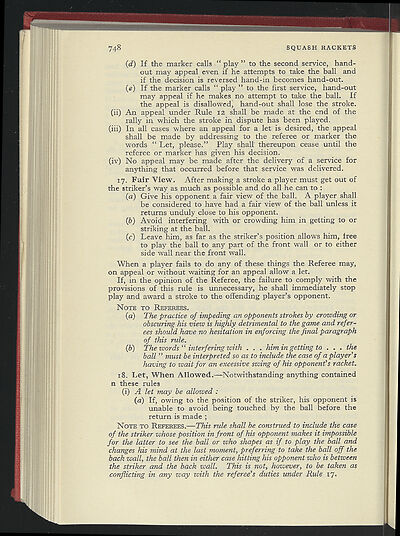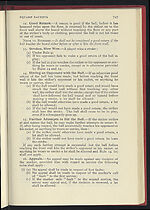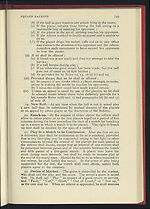1959-60
(822)
Download files
Complete book:
Individual page:
Thumbnail gallery: Grid view | List view

74
8
S
Q
UASH RACKETS
(d) If the marker calls." play" to the second service, hand-
out may appeal even if he attempts to take the ball and
if the decision is reversed hand-in becomes hand-out.
(e) If the marker calls " play " to the first service, hand-out
may appeal if he makes no attempt to take the ball. If
the appeal is disallowed
,
hand-out shall lose the stroke.
(ii) An appeal under Rule
12
shall be made at the end of the
rally in which the stroke in dispute has been played.
(iii) In all cases where an appeal for a let is desired, the appeal
shall be made by addressing to the referee or marker the
words " Let, please." Play shall thereupon cease until the
referee or marker has given his decision.
(iv) No appeal may be made after the delivery of a service for
anything that occurred before that service was delivered.
17.
Fair View. After making a stroke a player must get out of
the striker's way as much as possible and do all he can to :
(a)
Give his opponent a fair view of the ball. A player shall
be considered to have had a fair view of the ball unless it
returns unduly close to his opponent.
(b)
Avoid interfering with or crowding him in getting to or
striking at the ball.
(c) Leave him, as far as the striker's position allows him, free
to play the ball to any part of the front wall or to either
side wall near the front wall.
When a player fails to do any of these things the Referee may,
on appeal or without waiting for an appeal allow a let.
If, in the opinion of the Referee, the failure to comply with the
provisions of this rule is unnecessary, he shall immediately stop
play and award a stroke to the offending player's opponent.
N
OTE TO
R
EFEREES.
(a) The practice of impeding an opponents strokes by crowding or
obscuring his view is highly detrimental to the game and refer-
ees should have no hesitation in enforcing the final paragraph
of
this rule.
(b) The words " interfering with him in getting to . . . the
ball " must be interpreted so as to include the case
of
a player's
having to wait for an excessive swing of his opponent's racket.
18.
Let, When Allowed.—Notwithstanding anything contained
n these rules
(i) A
let may be allowed
(a) If, owing to the position of the striker, his opponent is
unable to avoid being touched by the ball before the
return is made ;
N
OTE TO
R
EFEREES.
—This rule shall be construed to include the case
of the striker whose position in front
of
his opponent makes it impossible
for the latter to see the ball or who shapes as
if
to play the ball and
changes his mind at the last moment, preferring to take the ball
off
the
back wall, the ball then in either case hitting his opponent who is between
the striker and the back wall. This is not, however, to be taken as
conflicting in any way with the referee's duties under
Rule
17.
8
S
Q
UASH RACKETS
(d) If the marker calls." play" to the second service, hand-
out may appeal even if he attempts to take the ball and
if the decision is reversed hand-in becomes hand-out.
(e) If the marker calls " play " to the first service, hand-out
may appeal if he makes no attempt to take the ball. If
the appeal is disallowed
,
hand-out shall lose the stroke.
(ii) An appeal under Rule
12
shall be made at the end of the
rally in which the stroke in dispute has been played.
(iii) In all cases where an appeal for a let is desired, the appeal
shall be made by addressing to the referee or marker the
words " Let, please." Play shall thereupon cease until the
referee or marker has given his decision.
(iv) No appeal may be made after the delivery of a service for
anything that occurred before that service was delivered.
17.
Fair View. After making a stroke a player must get out of
the striker's way as much as possible and do all he can to :
(a)
Give his opponent a fair view of the ball. A player shall
be considered to have had a fair view of the ball unless it
returns unduly close to his opponent.
(b)
Avoid interfering with or crowding him in getting to or
striking at the ball.
(c) Leave him, as far as the striker's position allows him, free
to play the ball to any part of the front wall or to either
side wall near the front wall.
When a player fails to do any of these things the Referee may,
on appeal or without waiting for an appeal allow a let.
If, in the opinion of the Referee, the failure to comply with the
provisions of this rule is unnecessary, he shall immediately stop
play and award a stroke to the offending player's opponent.
N
OTE TO
R
EFEREES.
(a) The practice of impeding an opponents strokes by crowding or
obscuring his view is highly detrimental to the game and refer-
ees should have no hesitation in enforcing the final paragraph
of
this rule.
(b) The words " interfering with him in getting to . . . the
ball " must be interpreted so as to include the case
of
a player's
having to wait for an excessive swing of his opponent's racket.
18.
Let, When Allowed.—Notwithstanding anything contained
n these rules
(i) A
let may be allowed
(a) If, owing to the position of the striker, his opponent is
unable to avoid being touched by the ball before the
return is made ;
N
OTE TO
R
EFEREES.
—This rule shall be construed to include the case
of the striker whose position in front
of
his opponent makes it impossible
for the latter to see the ball or who shapes as
if
to play the ball and
changes his mind at the last moment, preferring to take the ball
off
the
back wall, the ball then in either case hitting his opponent who is between
the striker and the back wall. This is not, however, to be taken as
conflicting in any way with the referee's duties under
Rule
17.
Set display mode to:
![]() Universal Viewer |
Universal Viewer | ![]() Mirador |
Large image | Transcription
Mirador |
Large image | Transcription
| Games and sports in the army > 1959-60 > (822) |
|---|
| Permanent URL | https://digital.nls.uk/248873724 |
|---|
| Description | 'Games and Sports in the Army' was an annual publication produced by the British War Office between the 1930s and 1960s. This included the Second World War. It outlines the rules and regulations for games and sports played by members of the armed forces. It features names and photographs of team members, and examples of contemporary advertising. |
|---|---|
| Shelfmark | GWB.52 |

